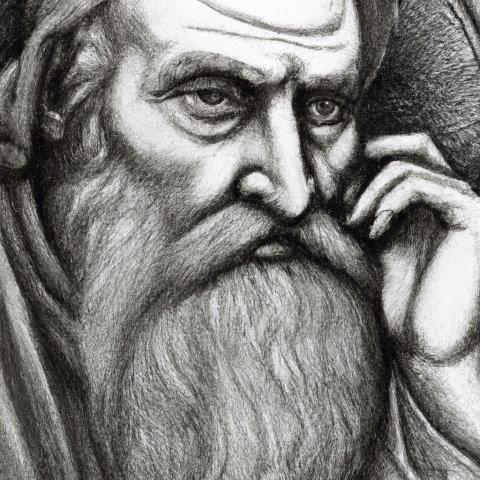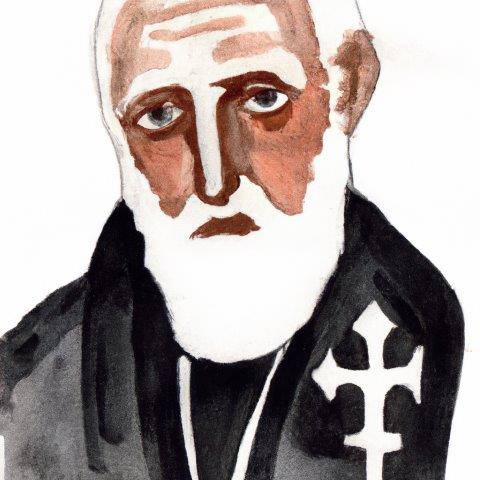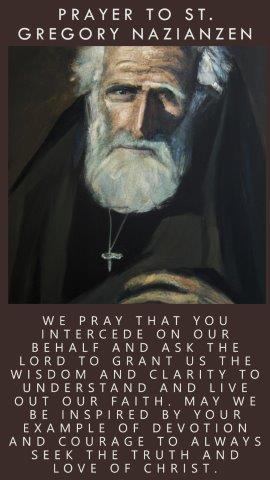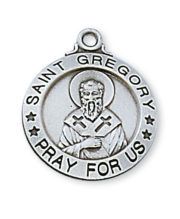Saints
St. Gregory Nazianzen
St. Gregory Nazianzen Biography
 St. Gregory Nazianzen, also known as Gregory of Nazianzus or Gregory the Theologian, was a 4th-century Christian bishop, theologian, and Doctor of the Church. He is considered one of the greatest theologians of the Eastern Church and one of the “”Cappadocian Fathers”” along with Basil the Great and Gregory of Nyssa.
St. Gregory Nazianzen, also known as Gregory of Nazianzus or Gregory the Theologian, was a 4th-century Christian bishop, theologian, and Doctor of the Church. He is considered one of the greatest theologians of the Eastern Church and one of the “”Cappadocian Fathers”” along with Basil the Great and Gregory of Nyssa.
Gregory was born in AD 329, in the city of Nazianzus, in Cappadocia (present-day Turkey). His family was well-educated and deeply religious, and his father, Gregory the Elder, was a bishop. Gregory was well-educated in classical literature and philosophy, and he was fluent in Greek, the language in which he wrote most of his works.
In AD 357, Gregory was ordained a deacon and began to work closely with Basil the Great, who was then bishop of Caesarea. He was appointed as bishop of Sasima in AD 365, but resigned from this position the following year due to poor health. He then moved to Constantinople, where he worked to combat the Arian heresy, which denied the full divinity of Jesus Christ.
In AD 379, Gregory was elected as bishop of Constantinople, but his tenure was troubled by political struggles and theological controversies. Despite this, he continued to defend the Nicene Creed and to promote the Trinitarian theology of the Father, Son, and Holy Spirit. He wrote many theological works and sermons that helped to solidify the Nicene doctrine of the Trinity, which came to be recognized as the orthodox teaching of the Church.
Gregory’s writings were greatly influential in the development of theology and liturgy in the Eastern Church. His works include five theological orations, including On the Holy Spirit and On the Trinity, as well as many sermons, letters, and poems. He also helped to establish the liturgical tradition of the Eastern Church, which emphasizes the use of poetry and song in the liturgy.
After the end of his bishopric, he retired to a monastic life and focused on writing and contemplation. He passed away in AD 390 and his works and teachings were greatly revered by many and passed down through the centuries.
Gregory was canonized by the Catholic Church and the Orthodox Church, and is recognized as a Saint and Father of the Church. His feast day is celebrated on January 2 by the Eastern Orthodox Church, and on January 9 by the Catholic Church. He is also recognized as a Doctor of the Church by both Eastern Orthodoxy and Catholicism.
The Life of St. Gregory Nazianzen
 St. Gregory the Great, because of his profound skill in sacred learning, was surnamed the Theologian. For ten years the young Gregory read law at Athens and then joined St. Basil in his monastic solitude near the river Iris in Pontus. He was ordained Priest in 371, and in 372 was consecrated Bishop of Sasima.
St. Gregory the Great, because of his profound skill in sacred learning, was surnamed the Theologian. For ten years the young Gregory read law at Athens and then joined St. Basil in his monastic solitude near the river Iris in Pontus. He was ordained Priest in 371, and in 372 was consecrated Bishop of Sasima.
He refused to take possession of his church of Sasima, but instead governed that of Nazianzum until his father died the following year. As soon as another Bishop was installed St. Gregory withdrew to Seleucia, where he remained five years. In 380 he was prevailed upon to accept the See of Constantinople. Because of his aged appearance, due to the many austerities he had performed, his poor garb, and extreme poverty, the proud citizens at first treated him badly.
St. Gregory Leads Others to Christ
The Arians pursued him with calumnies and insults. The prefects and governors added their persecutions to the fury of the populace. But God was with him, and the Angels guarded him. His cheeks were furrowed with the tears he shed as he daily prostrated himself before God to implore His light and mercy upon his people. Christians flocked to his discourses; heretics and pagans were moved to attend because they admired his learning and eloquence.
The sermons soon bore fruit: in a short time his flock became very numerous. He succeeded in conquering the obstinacy of the heretics by meekness and patience. St. Gregory remained in Constantinople only one month, after which he resigned and spent the remainder of his life in retirement near Arianzum until his death in 390.
In his letters he gave to others the same advice, of which his own life was constantly an example. One instance will suffice: A holy Priest was unjustly persecuted by slander. St. Gregory wrote to him thus in his third letter: “What evil can happen to us after all this? None, certainly, unless we by our own fault lose God and virtue. Let all other things fall out as it shall please God. He is the Master of our life, and knows the reason of everything that befalls us. Let us only fear to do anything unworthy our piety. We have fed the poor, we have served our brethren, we have sing the Psalms with cheerfulness. If we are no longer permitted to continue this, let us employ our devotion some other way. Grace is not barren, and opens different ways to Heaven. Let us live in retirement; let us occupy ourselves in contemplation; let us purify our souls by the light of God. This perhaps will be no less a sacrifice than anything we can do“.
St. Gregory as a writer ranks far above most Greek Doctors; in fact, he is surname by the Greeks “the Divine”. He is venerated in the East and the West as a Doctor of the Church
Popular St. Gregory Nazianzen Medal and St. Gregory Nazianzen Rosary
St. Gregory Nazianzen: Patron Saint of Poets and Theologians
St. Gregory Nazianzen is a revered saint who is remembered for his contributions to the Church and his legacy as a poet and theologian. He is honored as the patron saint of poets and theologians, and his life continues to inspire people all over the world.
Patron Saint of Poets
 St. Gregory Nazianzen is the patron saint of poets, and he is invoked by those who create and enjoy poetry. He is remembered for his own poems and orations, which were renowned for their beauty and depth, and he is seen as a symbol of artistic expression and creativity.
St. Gregory Nazianzen is the patron saint of poets, and he is invoked by those who create and enjoy poetry. He is remembered for his own poems and orations, which were renowned for their beauty and depth, and he is seen as a symbol of artistic expression and creativity.
Patron Saint of Theologians
St. Gregory Nazianzen is also the patron saint of theologians, and he is revered by those who study and teach theology. He is remembered for his contributions to the Church and his role in the development of Christian thought, and he is honored as a symbol of intellectual rigor and spiritual wisdom.
St. Gregory Nazianzen’s legacy continues to inspire people all over the world, and he is remembered as a great poet and theologian who dedicated his life to serving the Church and spreading the Gospel. Through his example, he reminds us of the importance of embracing our gifts and using them to serve others and to glorify God.
Reflection on the feast day of St. Gregory Nazianzen
Today, we celebrate the feast day of St. Gregory the Great Nazianzen, one of the greatest Doctors of the Church. St. Gregory was born in A.D. 329 in Arianzus, near Nazianzus in Cappadocia (modern-day Turkey). He was the son of St. Gregory the Elder and St. Nonna, and was raised in a Christian family with a strong tradition of learning and piety.
St. Gregory was well-educated and fluent in Greek, Latin, and Hebrew. He was a scholar and theologian, and his writings had a profound impact on the development of Christian thought. He was a friend of St. Basil the Great, with whom he studied in Athens, and together they were known as the Cappadocian Fathers.
St. Gregory was ordained a priest, and he spent much of his life preaching and teaching the Gospel. He was a tireless defender of the faith, and his eloquent sermons and writings challenged the heresies of the day and helped to solidify the orthodox teaching of the Church. He was also a man of great compassion and charity, and he devoted himself to the care of the poor and the sick.
St. Gregory was known for his profound humility and his love for God. He once wrote, “The love of God is like a river, constantly flowing, constantly giving.” This love was the driving force behind all of his actions, and it inspired others to follow his example. He taught that the goal of our lives is to draw closer to God and to love Him with all our heart, soul, mind, and strength.
As we celebrate the feast day of St. Gregory the Great Nazianzen, we are reminded of the importance of living our lives with a deep and abiding love for God. We are called to follow the example of St. Gregory by dedicating ourselves to the study of scripture and the teachings of the Church, and by using our gifts and talents to serve others. We are also called to cultivate a deep sense of humility and to trust in God’s love and providence, knowing that it is only through Him that we can achieve true happiness and fulfillment.
Let us pray for the intercession of St. Gregory the Great Nazianzen, that we may be filled with the same love for God that he possessed and that we may live our lives as he did, always striving to draw closer to our Heavenly Father. Amen.
Discover biographies, prayers, and reflections for more than 400 Catholic Saints
Prayers to St. Gregory Nazianzen
Prayer to St. Gregory Nazianzen for Wisdom and Understanding
 O Holy St. Gregory, bishop and doctor of the Church, you were known for your wisdom, eloquence, and devotion to truth. Pray for me, that I may grow in my understanding of the faith and be able to articulate it with clarity and grace.
O Holy St. Gregory, bishop and doctor of the Church, you were known for your wisdom, eloquence, and devotion to truth. Pray for me, that I may grow in my understanding of the faith and be able to articulate it with clarity and grace.
Help me to deepen my relationship with God through prayer, reflection, and study, so that I may better discern His will and follow it in all things.
Grant me the courage to stand up for what is right, even in the face of opposition, and to be a witness to the truth of the Gospel in all I say and do.
Through your intercession, may I come to know the love of Christ more deeply, and may I be filled with the Holy Spirit, who gives wisdom, understanding, and knowledge.
Prayer to St. Gregory Nazianzen for Courage in the Face of Temptation
St. Gregory, you lived in a time of great turmoil, when the Church was being tested by heresy and division. You stood firm in your faith, even in the face of opposition, and you did not compromise the truth of the Gospel.
Pray for me, that I may have the courage to resist temptation and to stand up for what is right, even in the face of persecution.
Help me to grow in my trust in God, and to rely on His grace in all things, so that I may remain steadfast in the face of adversity.
May I have the wisdom to recognize the tricks of the enemy, and the strength to resist them, through the power of your intercession and the help of the Holy Spirit.
Prayer to St. Gregory Nazianzen for the Gift of Discernment
O St. Gregory, you were known for your wise counsel and your ability to discern the will of God in all things. Pray for me, that I may grow in my ability to hear the voice of the Lord and to follow His guidance in all things.
May I be filled with the Holy Spirit, who leads us into all truth, and may I have the courage to act on the guidance I receive, even if it goes against my own desires or the expectations of others.
Help me to recognize the signs of God’s presence in my life, and to respond to them with faith and obedience. May I have the wisdom to see through the false teachings of this world, and to cling to the truth of the Gospel.
Through your intercession, may I come to know the Lord more deeply, and may I be a faithful servant of His kingdom, doing His will in all things.
Saints Similar to St. Gregory Nazianzen
You may also be interested in reading the Biography of St. Gregory the Great. St. Gregory Nazianzen and St. Gregory the Great are both recognized as important figures in the early Church. There are no direct connections to other saints in the list. Next up: Biography of St. Gregory the Great
Also check out our handmade St. Gregory Nazianzen Medal and St. Gregory Nazianzen Rosary and St. Gregory Nazianzen Rosary Bracelet .



